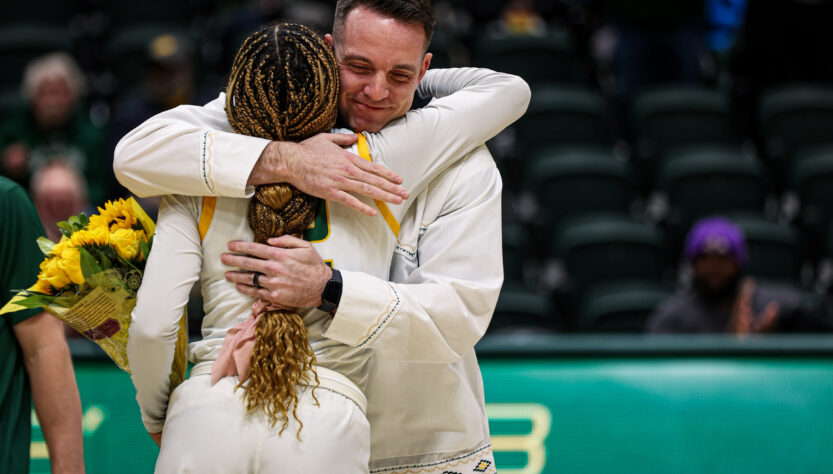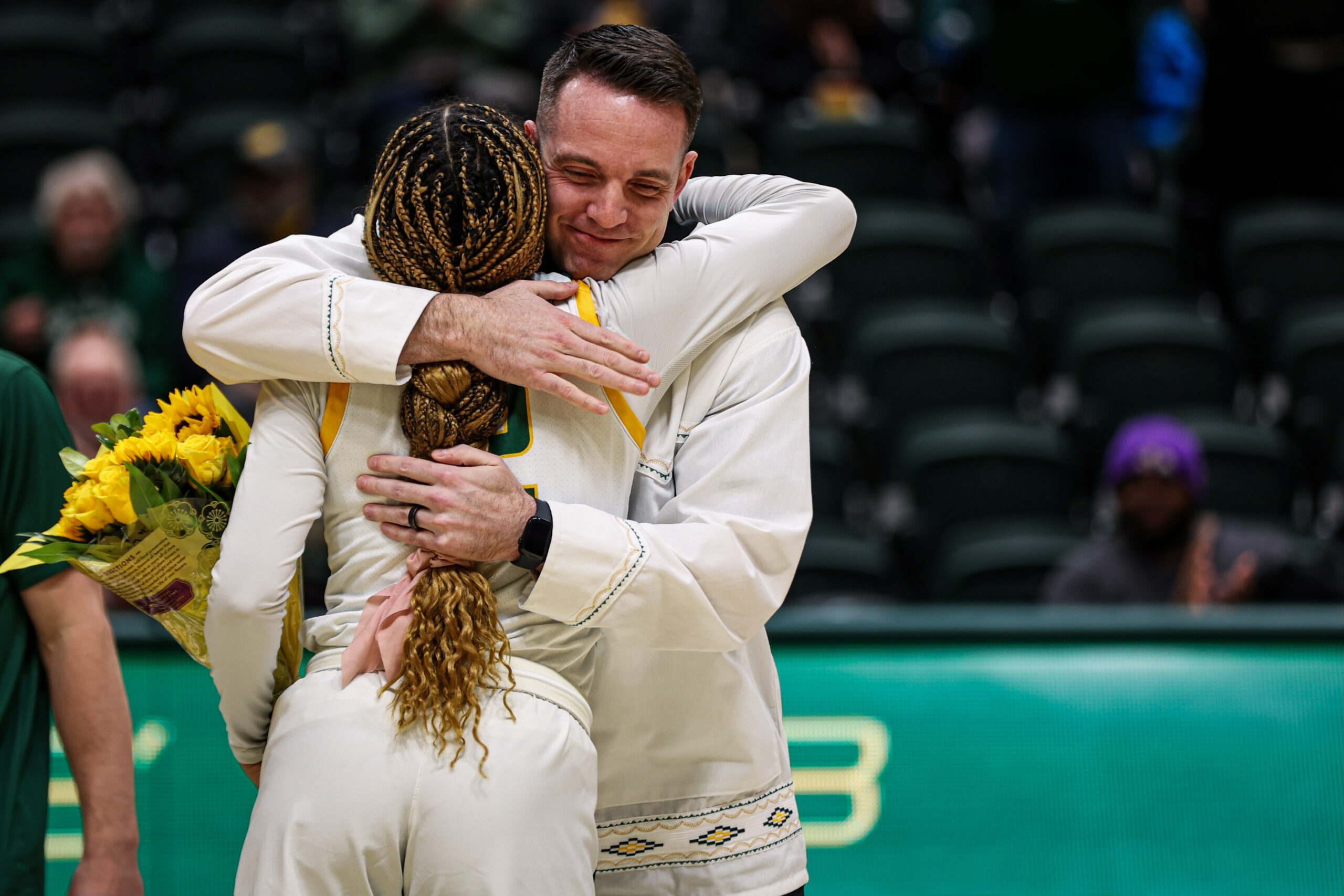
Part of being a competitive college athlete is dealing with serious injuries. Vishe’ Rabb knows that better than anyone else.
Words by Avery Williamson
It’s a move she practiced hundreds of times. Jab left, go right. Jab right, go left. The move was engraved in her mind.
It was the first game of the 2023 Great Northwest Athletic Conference basketball tournament. The 4th-seeded Seawolves were favored going into the game against the 5th-seeded Seattle Pacific Falcons, but they knew it would be a tight matchup.
Vishe’ Rabb–a transfer from Augustana University–had led the Seawolves all year. A month earlier, she had set a career-high of 35 points in an overtime loss against Northwest Nazarene. Her dominant performance marked the first Seawolf to score over 30 points in a game since 2018.
Her mind knew what to do–jab left, go right–but her body wasn’t on the same page.
As soon as she heard the pop, she knew what had happened. It was going to be another long nine-month recovery back to the basketball court.
For Vishe’, basketball and life are synonymous. Her parents were both collegiate basketball players, and her plans were no different.
Though she played other sports growing up, basketball was always her favorite. “I think basketball just always seemed so much more competitive to me,” she said.
“It seemed like something that I had a harder time mastering at different points, and I like pushing myself. I didn’t get the same competitiveness [from other sports].”
During her junior year of high school, she decided she wanted to play collegiately. She spent five years–including a traditional redshirt year and a medical redshirt year–at Augustana before transferring to UAA to use her final two years of eligibility.
Oddly enough, UAA wasn’t on her radar until the last minute. “I was actually on a visit somewhere else and I got this email pretty late at night,” said Vishe’.
The email was from head coach Ryan McCarthy. He had sent Vishe’ a video that showed UAA’s “winning culture.”
After watching it, Vishe’ knew UAA was the right fit. “That’s what I wanted,” she said.
“I wanted a winning culture. I wanted a team culture. I wanted rings. So that was kind of like, ‘duh.’ It was a pretty easy choice.”
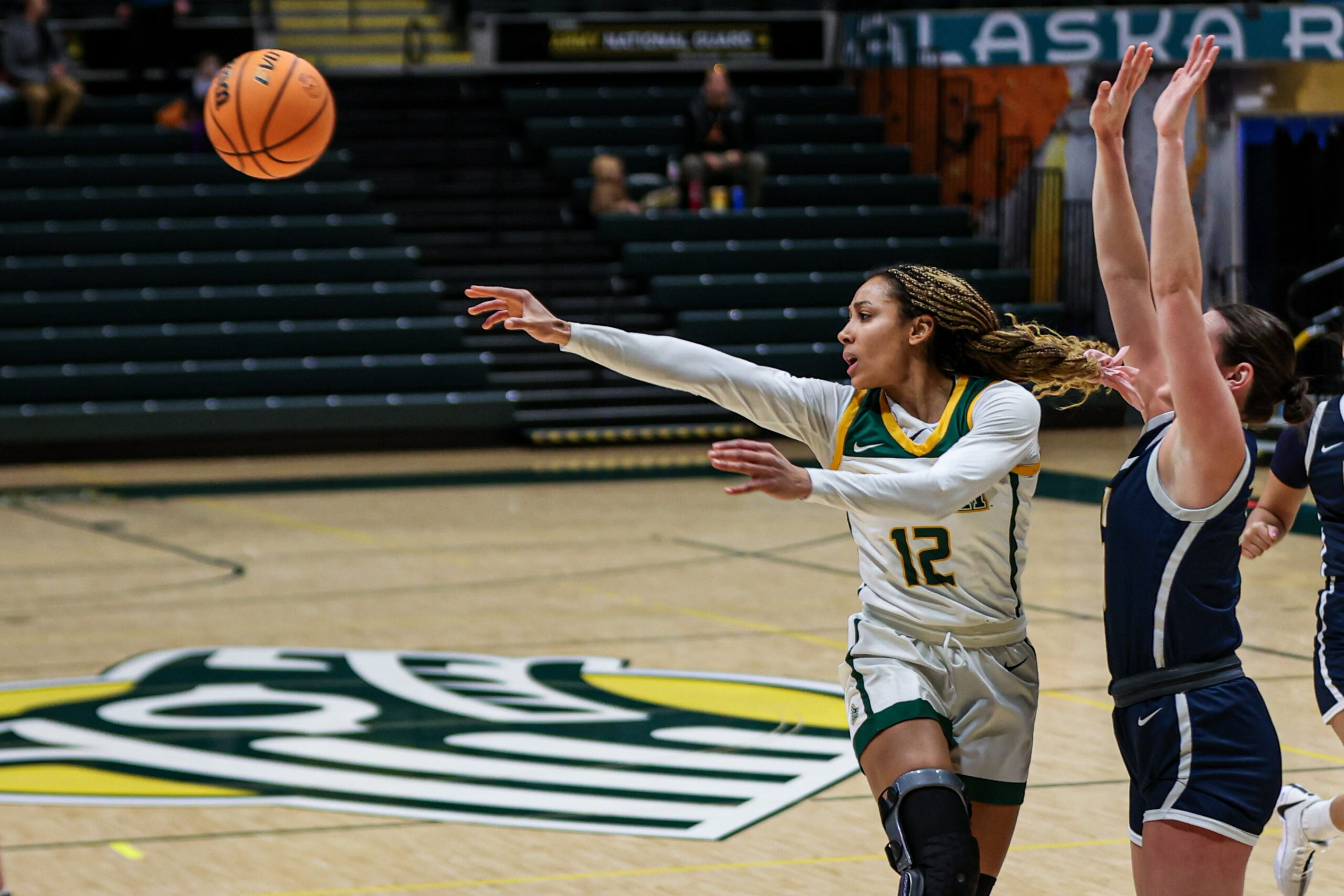
Photo courtesy of Stephanie Burgoon.
Unlike many transfers, Vishe’ wasn’t worried about packing up her things and heading to Alaska. Instead, “everyone had [reservations] for me,” she said.
But after they got over those initial reservations, her friends and family were supportive of her decision. “They always encourage me to try new things, to be unique. So when I got the opportunity, I was like, ‘Why not Alaska?’“
And UAA is lucky the Minnesota native packed her bags and flew up to the Last Frontier. After playing 77 games for Augustana, she finished her South Dakota career with an impressive 864 points, 299 rebounds, 132 assists, and 104 steals.
“When we saw Vishe’s name in the transfer portal, she was someone who stood out right away to us,” head coach Ryan McCarthy told media relations director Nate Sagan in a press release.
“Her athleticism is special, and at 5-9 to 5-10, her length makes her very versatile in a backcourt role. Vishe’ has accomplished some impressive accolades so far, and I truly believe her best basketball is still ahead of her. I’m excited to see her game take another jump as she gets into a system that fits her strengths so well.”
During her first season at UAA, she grabbed the second-place spot in Seawolf history for free throw percentage, making 87.9% of her attempts.
She was also named All-Conference (1st team), All-Region (2nd team), GNAC Newcomer of the Year and Team MVP.
Her impressive season didn’t come to the end she wanted, though. Instead of the swish of the net, she heard a pop in her knee with two minutes left until the final buzzer.
Vishe’ had already paid her time four years prior when she tore her ACL in practice at Augustana. She thought she was done with knee injuries, but her body said otherwise.
The first tear happened in 2019. Initially, she was hopeful. “I think I genuinely had sprained it,” she said.
“Since it didn’t get diagnosed for a week or two, I was still trying to run. I was still trying to do things.”
Eventually, it was too much for her vulnerable knee, and she tore it in practice.
“That was a disappointing one because I was like, ‘I could have already had surgery.’ That stuff is pretty time-sensitive because it’s a nine-month recovery.”
But she stayed strong. She persevered through the injury and returned to the court tougher than ever. Little did she know she’d be right back in that spot four years later.
This second time around, she didn’t feel any hopefulness. “I did hear it pop. I was pretty sure of it when it happened.”
On top of that, the Seawolves weren’t able to defeat Seattle Pacific and were knocked out of the GNAC tournament in the first round, concluding their season on a sour note.
“That kind of just took it out of me for a while,” she said. “If we would have won I would have probably been a lot more able to swallow it, but I hate losing.”
But she knew she couldn’t dwell on it anymore. It happened, and now she needed to recover from it.
After getting surgery, her physical therapist wanted her to take a year to recover since she had already gone through an ACL injury.
“They were really encouraging me to come back at a year and I was like, ‘well, in a year the season’s done.’”
She put her foot down and told him, “No, that would not happen.”
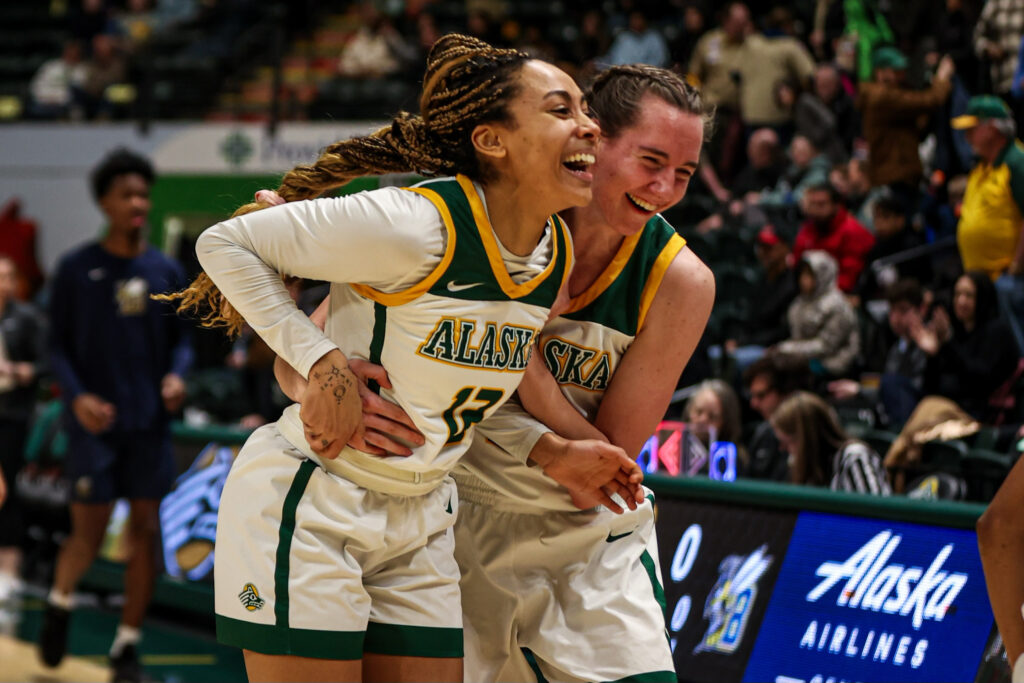
Photo courtesy of Stephanie Burgoon.
When basketball has been your life for so long, taking a year off “isn’t an option.”
The first two weeks of the recovery process were the worst. She relied on her sister and boyfriend to help her through the days.
“It’s hard to have to keep up on medicine, keep up on food, water, and all this other stuff. Really simple stuff that you don’t think about adds up.”
By one month, she was walking again.
By four months, she was running.
She dedicated her summer to lifting. “I wanted to come back really strong.”
It paid off. “Even now, all my teammates call me jacked.”
Around seven months, she started doing individual workouts.
And by eight and a half months, she was cleared to practice with the team again.
Vishe’ returned to the court on Jan. 4 to face off against Western Washington. She carried the team to a 61-54 victory with 16 points, four rebounds and three assists.
She helped her team head to the 2024 GNAC tournament as the 3rd seed–where the Seawolves took on Seattle Pacific once again. This time, though, it was a story of success as the team defeated the Falcons 79-57 to advance to the semifinals against the Western Washington Vikings.
Unfortunately, the Seawolves were kicked out of the GNAC tournament by the 2nd-seeded Vikings, concluding the season for the team and marking the end of Vishe’s collegiate career.
“I was extremely disappointed [about the end of the season]… But that melted away after about a day into being really grateful,” said Vishe’.
“I have had some of the coolest experiences from basketball and met longtime friends from all levels, so even being about to feel such an intense feeling of competition until the end is something that I was thankful for.”
Miraculously, through all the tough losses and brutal injuries, Vishe’ has maintained a positive attitude. Instead of letting it tear her down, she’s used it as an opportunity to get better.
It’s helped her learn how to give herself grace. “I’m typically not someone that gives myself a lot of grace anyway, and then, all of a sudden, I had to. It was humbling.”
It’s also taught her how to be a better teammate. “If you’re not someone that’s going to constantly score, you have to be able to be a well-rounded teammate in terms of giving great bench energy, picking up your teammates, rebounding, hustling, and doing all the things that are still important to the game and can’t be overlooked.”
And lastly, it’s helped her work ethic. “It’s been the thing that’s elevated my game every time and I think it just comes from working harder every time. From the first time it happened to the second time it happened, my work ethic got even better both times.”
Now that she’s had time to reflect on the process, she’s “extremely grateful.
“If anything, it’s made me a better leader,” she said.
“You have to be able to compartmentalize things. You have to understand where you’re at mentally and still be able to pour everything into what you’re doing every day. It’s a big commitment being a student-athlete.”
As she finishes up her final year of eligibility, she’s continuing to push herself every day and dream big. “I have aspirations to play professionally for like a year or two,” she said.
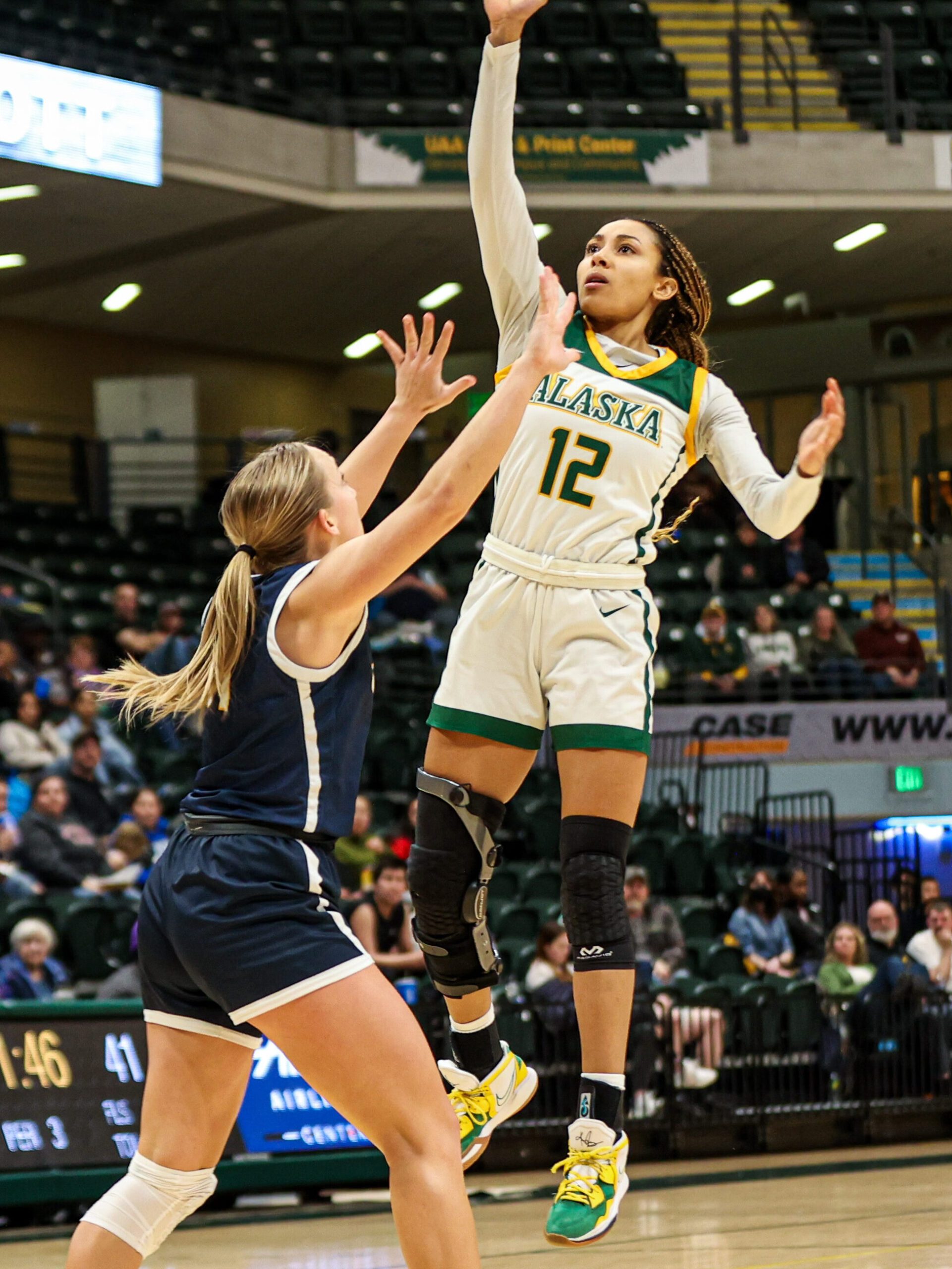
Photo courtesy of Stephanie Burgoon.
With her mental toughness and work ethic, don’t be surprised when you hear Vishe’s name for years to come.
True North is a publication of the University of Alaska Anchorage Department of Journalism and Public Communications. It has been published since 1995.

